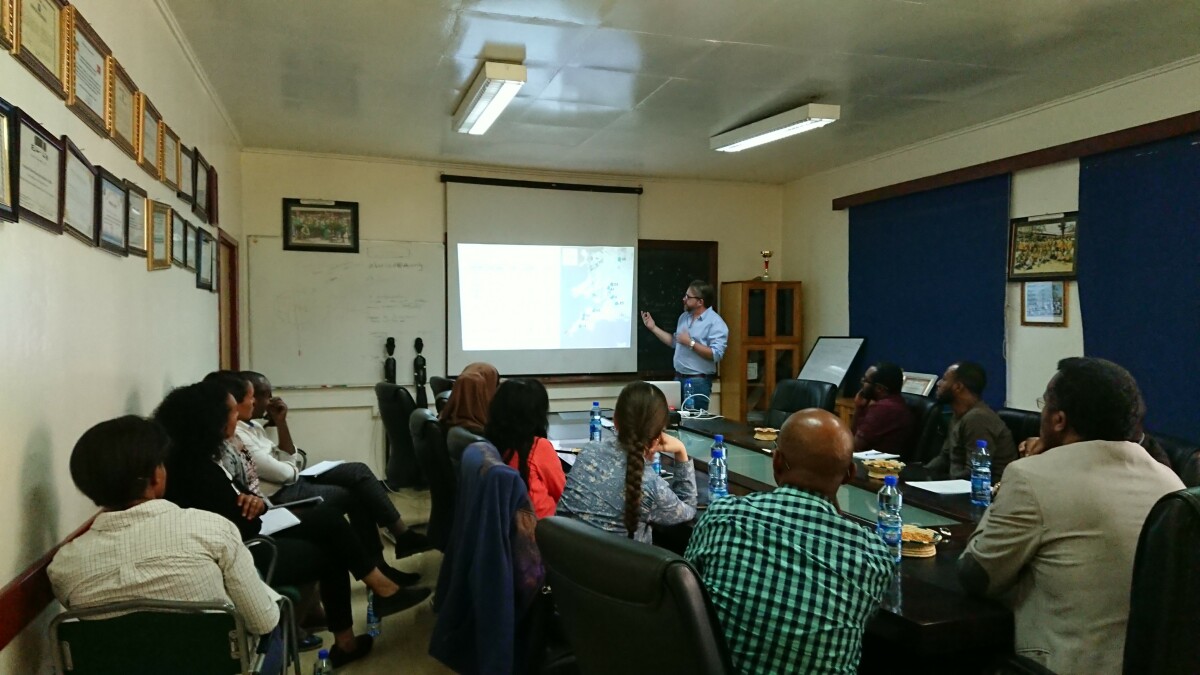Establishing collaborations to strengthen bioinformatics capacity in Ethiopia

Written by Amit Bhasin and Andries Van-Tonder
During the week of the 17th - 21st January 2020, I accompanied Dr Andries van Tonder (Bioinformatician, Department of Veterinary Medicine) on a visit to Ethiopia to connect with colleagues at the Armauer Hansen Research Institute (AHRI) and the National Animal Health Diagnosis and Investigation Centre (NAHDIC). Our aims were to assess current capabilities and capacity of AHRI bioinformatics team and physical resources available, to identify the bioinformatics training needs of researchers at both Institutions. Both AHRI and NAHDIC have acquired Illumina next generation sequencing equipment and are “sequence ready” with senior staff having received “wet” and “dry” lab training at the Los Alamos National Laboratory, New Mexico, USA.
Our two-day visit to AHRI started on the Monday morning with a chance meeting in the AHRI vehicle with Dr Se Eun Park, a Research Scientist from International Vaccine Institute, who it turned out was due to visit colleagues at the School of Clinical Medicine in Cambridge straight after her trip to Ethiopia! Andries and I were met by Dr Markos Abebe, Lead Scientist, Biotechnology and Bioinformatics Research Directorate, and Dr Yonas Kassahun, Team Leader and Senior Bioinformatician. AHRI’s research activities cover basic (immunology and molecular biology), epidemiological and translational research and we had the opportunity to tour of the research facilities and busy laboratories – this included locating a -85oC freezer that had been purchased as part of the African Meningococcal Carriage Project (MenAfriCar) some years previously.
We were excited to hear about plans for, and visit the site of, the large new research laboratory complex that is being built to accommodate the expansion of research activities being conducted at AHRI which has seen an increase in staff levels to 350. It has been some years since my last visit to AHRI and it was fantastic to see how much it has grown and developed. We met members of the bio-informatics team and spent some time discussing the role of the numerous International partners and projects working with AHRI, what each of these programmes provided in terms of training and knowledge transfer, what training in bioinformatics staff had already received (through the TBGEN project, DTRA and SABI) and what areas the team felt needed strengthening with support from the Parkhill Group in Cambridge to utilise the new sequencing facility to its maximum. We were fortunate to have time to continue discussions with Dr Alemseged Abdissa, Deputy Director on our second day and discussed some of the roadblocks they are experiencing re studying pathogen genomics. Andries gave an impromptu seminar to members the bioinformatics team on his ongoing work on bovine TB and we just about managed to squeeze in a quick pit-stop at a local coffee house on our way back.
We were up bright and early the following day to start our journey to NAHDIC, situated approx. 25km from Addis. NAHDIC, which had recently celebrated its 25th silver jubilee anniversary, has a new purpose built microbiology laboratory which is used for the diagnosis of zoonotic and highly contagious livestock diseases such as avian influenza, bovine tuberculosis, anthrax, brucellosis, Rabies, Rift valley fever, etc. Met by Dr Getachew Abichu, whole genome sequencing (WGS) responsible person and Dr Rediet Belayneh, coordinator for the molecular biology laboratory, we were shown round the numerous laboratories, met some of the research students and staff and were shown the sequencing suite. Work on connecting the server and remaining infrastructure was due to be completed shortly at which time sequencing work would be able to commence. On the second day of the visit, Andries had a productive discussion around NAHDIC’s new sequencing capacity with Dr Tesfaye Rufael, NAHDIC General Director followed by another well-received seminar on his TB work. The rest of the day was spent with Mr Gizat Almaw and Mr Getnet Mekonnen, two PhD students on the ETHICOBOTS project whom Andries has been assisting with bioinformatics analyses.
On the final day of the trip Andries was picked up bright and early for a 45 km trip to Addis Ababa University’s College of Veterinary Medicine and Agriculture in Debre Zeyit (Bishoftu) where he was met by Mr Bedaso Edao, a Cambridge PhD student who spent several months working alongside Andries in the Parkhill group. Andries first met with the Dean of the College, Dr Fikru Regassa, who has tasked Bedaso with using the connections gained during his PhD to build collaborations between the department and groups in Cambridge, and is also very interested in any participating in any training opportunities that may result from this trip. Following another presentation of Andries’ work (which he says went down well!), the final couple of hours before the return trip to Addis were spent exploring the beautiful town of Debre Zeyit which is built around seven crater lakes and is renowned for its’ resorts.
A busy week of really useful and informative interactions left us both feeling that there were some great opportunities for future collaborations between Cambridge and colleagues in Ethiopia in the area of bioinformatics - which we now need to move forward with!

